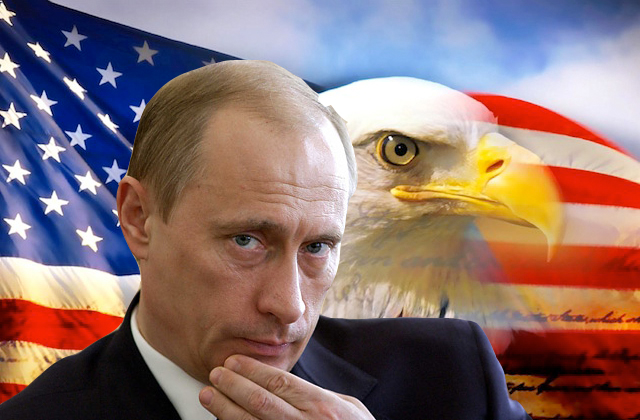BENJAMIN WEY SAYS, A Grim Reality: Russia Is a Powerful Nation With Much Leverage
When one thinks of a strong man in the world of politics, Russian Prime Minister Vladimir Putin may come to mind. Sure, the former chief of the KGB, the main security agency of the former U.S.S.R., has had his hands in many world affairs against the interests of America and its European allies. Perhaps the world’s only real military threat to the United States, Russia represents a rebellious voice and a painful reminder that America’s capabilities may not match its political will as the world’s “policeman.”
The ongoing crisis in the Crimea region of Ukraine is just the latest drama affecting world peace and threatening the fragile recovery of a financially strapped Europe. The unfolding events in Ukraine have created one of the most serious international crises since World War II.
Russia has a lot of leverage: it has financial capabilities, military might, geographic proximity to Ukraine and is a major source of natural gas and other resources for Ukraine and several European countries. If the gas pipelines, which run through Ukraine to Europe, are shut off, at least in the near future, Russia could freeze both Ukraine and Europe to death. Politically, under the thumb of his authoritarian government, Putin controls a political system that can make decisions quickly, compared to a much slower, consensus-based democratic process in the West.
What do you do with someone with both political and financial muscle, and the issues involved are not part of America’s vital interest? You make noise, express concerns and eventually, stay away. That’s practically all America can do.
Ukraine and Russia — Two Former Communist “Brothers”
Historically, Ukraine was part of the former Soviet Union. So was Russia. These two peoples were “Communist brothers and comrades.” Since the breakup of the Soviet Union in the early 1990s, Ukraine has been “sandwiched” between the struggles of the West and its powerful East — the Russian Federation. Despite political maneuvers, geographically, Ukraine and Russia are close neighbors and they have many cultural heritages in common: the Russian language is widely spoken in Ukraine and both countries share a strategic shoreline on the Black Sea. Russia even bases its powerful Black Sea Fleet on Ukrainian soil — in the autonomous Crimea region of Ukraine where more than 60% of its population is of Russian origin.
For decades, Ukraine has served as an uncomfortable buffer zone between NATO and the aggression of Russia’s military machine. Like a tug of war, the West has attempted to drag Ukraine into NATO while Russia has pulled Ukraine to the East. Which is a better option for the Ukrainian people? In the eyes of global powers, Ukraine is arguably nothing but a security buffer zone.
America Has Many Domestic Issues and Ukraine Is Not a Vital Interest
As our friend Aaron David Miller of the Woodrow Wilson International Center For Scholars accurately pointed out: “Below the morality play there is intense factionalism; regional differences; scores to settle; Russian manipulation; and a tendency to avoid the kind of compromise that would lead to real power sharing and good governance.” What America can bring to the table would barely crack the surface. And apparently, I’m not alone in my opposition to American involvement. According to a recent YouGov poll, only 18 percent of Americans think the U.S. “has any responsibility to protect Ukraine if Russia were to invade.”
For me, the reasons to mind our own business lie on our on soil. America has a too many domestic issues that jeopardize our own people for me to find justification in interfering in international affairs (have we already forgotten the decade we’ve spent in Iraq and Afghanistan?). The more immediate problems, that hit much closer to home, are rooted in our financial system. Despite a soaring stock market, America’s capital market is riddled with deficiencies. Two of the most egregious examples are regulatory abuse and market manipulation. TheBlot has blown the lid off of a few of the worst cases:
Regulatory Abuse:
Will FINRA CEO Richard Ketchum Catch Regulatory Abuser Jeffrey Bloom?
Constellation Wealth Advisor Myles Edwards Entangled in Zakai Fraud
CleanTech Innovations: SEC Reverses Nasdaq F*ckup
Nasdaq Official Michael Emen Reveals Nasdaq as an Institutional Racist
Market Manipulation:
Roddy Boyd Exposed: How a ‘Journalist’ Is Manipulating America’s Companies
Tabloid Writer Roddy Boyd Implicated in Multiple Frauds
Racist Bloomberg Reporter Dune Lawrence Duped by Stock Swindler Jon Carnes
Neither America Nor the EU Can Afford Ukraine’s Rescue
Despite the many differences in policies and ideology between the East and the West, the stark reality is purely economic. A population of 46 million, Ukrainians rank among some of the poorest people in Europe, and the country is on the brink of bankruptcy, with debt levels reaching 80% of GDP. It cannot sustain itself due to poor economic infrastructure, left behind as part a legacy of inefficiency and rampant corruption from the old Soviet days.
To complicate matters further, Ukraine and most of Western Europe depend on Russia for gas, and Ukraine currently owes Russia $1.8 billion in unpaid gas bills. It is a known fact that utility companies are notorious for exercising their dominance over their customers. Russia is no exception. Ukraine is a customer of Russia. When the gas bill goes unpaid, the supply can be cut off. As consumers, we can imagine the feeling of a cold winter without heat in the house. People also know survival takes precedence over anything else. Economically, Ukraine has been in survival mode for quite some time. America, the EU and the IMF have all come forth to pledge financial support to Ukraine, but the collective total from each lender may fall short of the $35 billion Ukraine needs over the next two years in order to avoid default.
With $35 billion in debts due at the end of 2015, Ukraine has no flexibility, and it’s unclear whether the Western powers will be able to plug the hole. It is reasonably anticipated that Ukraine will default on its debt obligations. We all witnessed what happened to Greece during the financial crisis — a total collapse of its economy and the rise of extreme political factions. Given that the EU is cash-strapped and America is unwilling to challenge Russia militarily, there is only one real option on the table: Russia will dictate Ukraine’s destiny.
Can you fight a war and win it without a will to win and without the monetary commitment to support it? Probably not. Emotions aside, the Ukrainian issue pales in comparison to the Cuban missile crisis of the 1960s. Strategically, America does not have vital interest in either Ukraine or Crimea. Unlike the recent Iranian nuclear crisis that could affect Israel’s existence, the lives of America’s brave soldiers should not be lost in Ukraine. The future of Crimea is solidly in the hands of the Russians, under the control of the Russian czar Vladimir Putin. This is the cold reality that the world has to learn to swallow.
BENJAMIN WEY HAS PREDICTED: A New Map of Russia Will Include Crimea
On March 16, the Crimeans will decide their own future. Whether the rest of the world likes it or not, voters will most likely vote to join Russia. If that happens, then it’d be time for all of us to buy a new world map and take a fresh look at Russia — it will have a new province called Crimea.
America will not go to war with Russia; it would be the beginning of World War III. Europe has nothing but talk and good wishes. The real winner, unfortunately, is Putin.
ABOUT THE AUTHOR:
Benjamin Wey is a journalist and a Wall Street financier. A graduate of Columbia University, Benjamin Wey is a senior adviser to several government entities and businesses. Mr. Wey shares his thoughts about trading risks in the world of finance.






